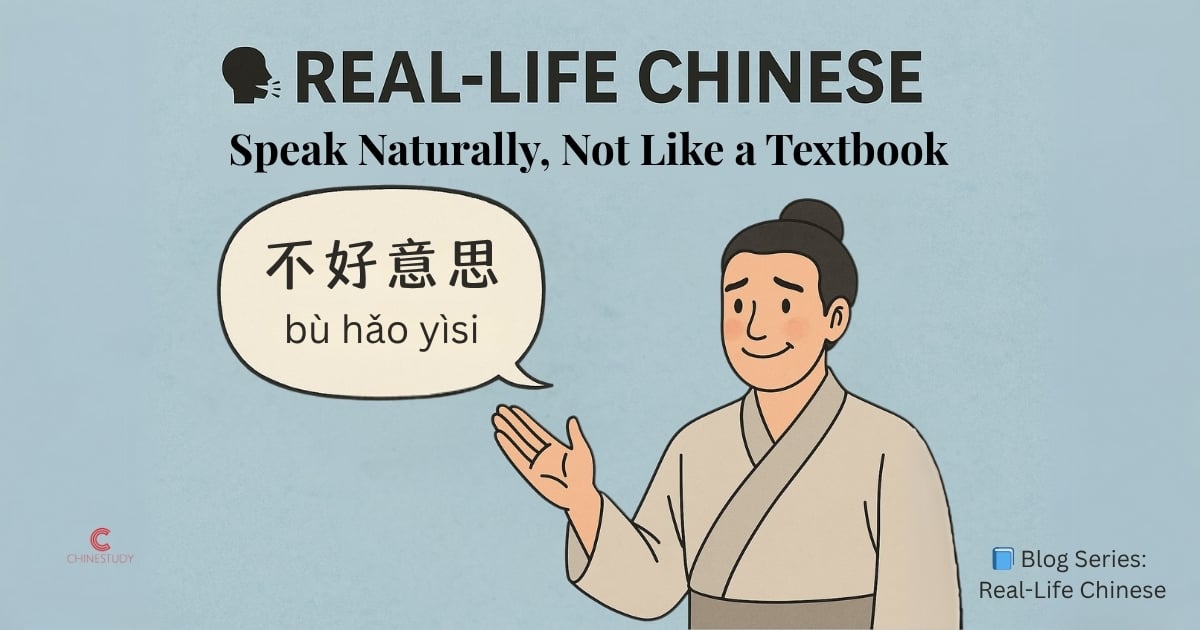How Chinese People Really Say “Sorry” — Not Just “对不起”

Want to sound more native? Start here.
🚫 Textbook Chinese
对不起 (duìbuqǐ) – I’m sorry
Yes, it’s correct.
But in everyday life, native speakers often say “不好意思” to soften an apology — especially for small things.
✅ Real Chinese
不好意思 (bù hǎo yìsi) – Sorry / Excuse me / I feel a bit embarrassed
This phrase is gentler and more flexible.
Use it when you’re:
- Bumping into someone
- Interrupting
- Asking a favor
- Running a little late
- Feeling shy or awkward
It’s polite, warm, and much more common in spoken Chinese.
🔍 Break It Down
- 不 (bù) – not
- 好意思 (hǎo yìsi) – to feel comfortable / to feel okay about something
👉 Literally: “Not feeling at ease” or “I feel awkward”
Used to express light embarrassment, politeness, or mild apology.
💡When to Use It
Use 不好意思 when you want to sound polite, friendly, and a little softer than a direct “sorry.”
👉 Common real-life situations:
- When you interrupt someone
- If you’re a bit late
- When you ask a favor
- If you bump into someone
- When you feel a little shy or awkward
It’s a polite phrase that helps smooth small moments in daily conversation.
🧱 Example Sentences
1. 打扰一下,不好意思。
(Dǎrǎo yíxià, bù hǎo yìsi.)
👉🏼 Excuse me for interrupting.
- 💡 For polite interruptions
2. 不好意思,我来晚了。
(Bù hǎo yìsi, wǒ lái wǎn le.)
👉🏼 Sorry I’m late.
- 💡 Apologizing for lateness
3. 不好意思,可以麻烦你一下吗?
(Bù hǎo yìsi, kěyǐ máfan nǐ yíxià ma?)
👉🏼 Sorry, could I trouble you for a moment?
- 💡 Polite request
🤓 Why It Sounds Better
- Softer tone – doesn’t sound too heavy or dramatic
- Used more often – especially in casual settings
- Polite without over-apologizing
- Helps you sound more natural and culturally aware
⚠️ Common Mistake
❌ Saying 对不起 for every small thing
对不起 sounds like a serious apology — better for major mistakes.
✅ Say 不好意思 instead for:
- Light delays
- Asking something
- Small social slips
It’s the go-to phrase for soft, polite moments.
🏆 Quick Practice
Q: You’re five minutes late to class. What do you say?
A. 对不起 (duìbuqǐ)
B. 不好意思 (bù hǎo yìsi)
✅ Correct Answer: B – It’s more casual, natural, and polite for this kind of situation.
✨ Final Thoughts
If you want to sound more polite and natural in Chinese, use 不好意思 (bù hǎo yìsi) instead of the heavy-sounding 对不起 in daily situations.
It’s soft, common, and fits perfectly in real conversations.
👉 Use it next time you’re late, interrupt, or need something small — you’ll sound more polite and fluent.
📘 Want more like this? Check out the full blog series: Real-Life Chinese
Thank you for subscribing!
Have a great day!